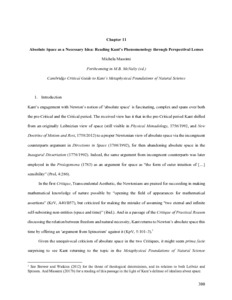Massimi, Michela
(2021)
Absolute Space as a Necessary Idea: Reading Kant’s Phenomenology through Perspectival Lenses.
[Preprint]
![[img]](https://philsci-archive.pitt.edu/19162/1.hassmallThumbnailVersion/Massimi%202021%20Cambridge%20Critical%20Guide%20to%20Kant%27s%20MFNS%20-%20PhilScie%20Archive.pdf)  Preview |
|
Text
Massimi 2021 Cambridge Critical Guide to Kant's MFNS - PhilScie Archive.pdf
Download (432kB)
| Preview
|
Abstract
In the last chapter of the Metaphysical Foundations of Natural Science, in the General Remark to Phenomenology, Kant famously argued that absolute space “is therefore necessary, not as a concept of an actual object, but rather as an idea, which is to serve as a rule for considering all motion therein merely as relative; and all motion and rest must be reduced to absolute space, if the appearance thereof is to be transformed into a determinate concept of experience (which unites all appearances)” [560]. This defence of absolute space might seem prima facie puzzling, considering Kant’s criticism of absolute space in the Transcendental Aesthetics of the first Critique. I have reconstructed elsewhere (Massimi 2017a, 2017b) Kant’s mature view on absolute space and its troubled Newtonian legacy. In this chapter, I take a fresh look at this central chapter of the Metaphysical Foundations of Natural Science with a main goal in mind: to offer a novel reading of this defence of absolute space. I will argue that Kant’s defence of absolute space as a necessary idea is congenial to Kant’s wider commitment to the faculty of reason (and its ideas) as "foci imaginarii" playing an “indispensably necessary” role for a correct empirical use of the faculty understanding (Kant KrV, A645/B673). Elsewhere (Massimi 2017c) I have offered a perspectivalist reading of Kant’s doctrine of the transcendental illusion. In this chapter, I work out the details of such perspectivalist reading in explaining the central role that Kant attributes to absolute space in the Phenomenology chapter of the MFNS.
Monthly Views for the past 3 years
Monthly Downloads for the past 3 years
Plum Analytics
Actions (login required)
 |
View Item |



